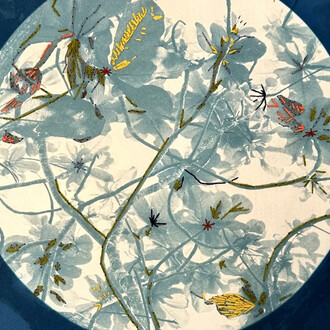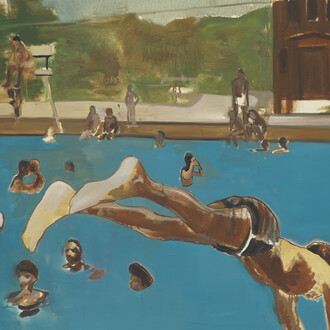Team (gallery, inc.) is pleased to present a one-person exhibition of new paintings by Andrew Jilka, entitled Meditations, from 14 November through 21 December 2019. This is the ninth entry in our project room series “Gallery B”. Team is located at 83 Grand Street in New York, cross streets Wooster and Greene, on the ground floor.
Andrew Jilka’s paintings set their sights on the accessibility of contemporary art and the pervasiveness with which its discourse is built upon a shared familiarity with a set of institutionally-endorsed works. His paintings map out scenes of collision with the aim of a reconciliation of imagistic stylizations unbound by time and place. The title of his show might reference writings by Descartes or Marcus Aurelius (he of the original self-improvement text), putting us in mind of certainty and ambiguity, stoic logic and sophist contemplation. Jilka toys with doubt, perception, and multiplicity, deriving meaning and visual pleasure not only from the relational coherences and disjunctures he orchestrates but the conceptual and aesthetic challenges they induce.
In his work, Jilka’s base layers are sourced largely from points of interest in bygone masterpieces, often those depicting scenes of domesticity or classical portraiture. He then compounds these scenes further by superimposing proposed contemporary counterparts, such as coloring book illustrations, unactivated in their purpose with a pristinely blank interiority. A rejection, seemingly, of the age-old adage to always color inside the lines activates our recognition of the demarcated yet blurred boundaries between these sources that results from their compositional integration. In Jilka’s excavations, the layers refuse to cohere, each genus adamantly holding on to its originary primacy. For example, illusionary space – sometimes preserved in the art historical layer, sometimes in the overlay from a commercial source – flattens exactly at the moment of our retinal recognition; the paintings coming in and out of focus.
In one piece, the agonized horse lifted from Picasso’s anti-fascist magnum opus Guernica serves as the backdrop for a gang of children sliding down the back of a Brachiosaurus. Joining this visual conflict is the cover of a self-described “life changing” guide titled, with laughable simplicity, How To Stop Worrying And Start Living. The author suggests we Cooperate with the Inevitable, and Don’t Worry About the Past, and the final sections advise to Stop Thinking About the Problem, and Focus on Good Things. As the easygoing children aboard the dinosaur illustrate, when life gives you mass extinction events, you might as well use them for fossil-fueled, freewheeling fun. Jilka’s composition effects radical shifts in tone that we cannot compartmentalize, and signals how complacency and brutality all-too-easily coexist; the slippery slope of blasé optimism, the wishful thinking that Worry, and its underlying causes, can be conquered through willful ignorance.
Jilka’s fascination with Picasso refers less to the mythology of the man himself, more so coopting the visual language of his decidedly warped perspective in a way which cuts to our understanding of hierarchical name-brand art recognition. The known mark-maker is absorbed, then regurgitated, creating new associations within our own expressive familiarity.
If Degas was correct in his assertion that “Art is not what you see, but what you make others see”, then Jilka’s concerns are with re-orienting public perception of the bridges between a formal and informal understanding of creative fulfillment. His works provide a necessary reminder that the opportunity to participate in art-making is entirely dependent on a culture which encourages it.
















